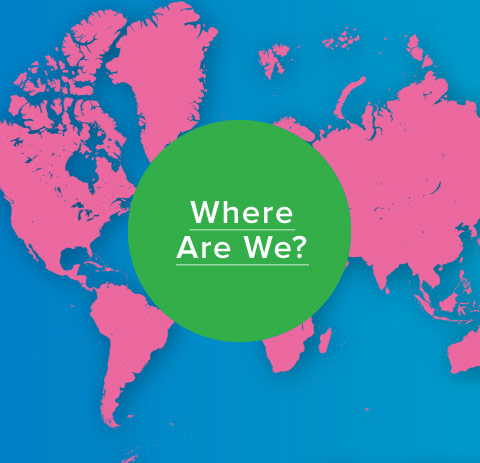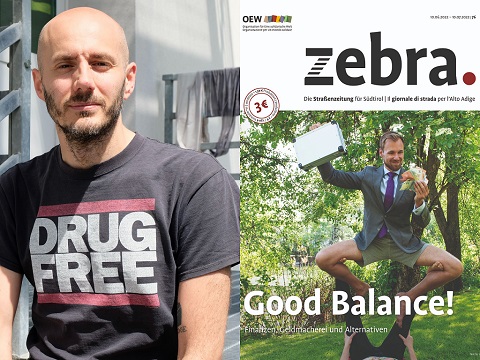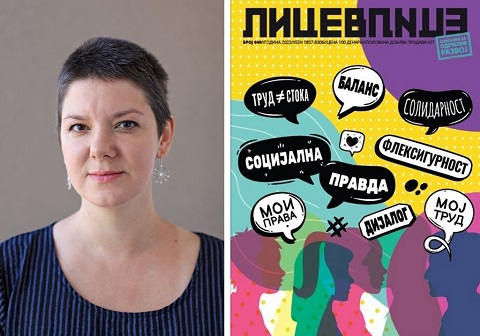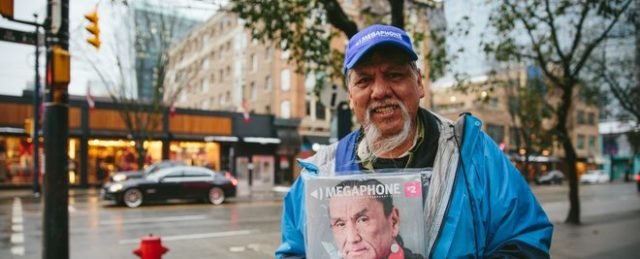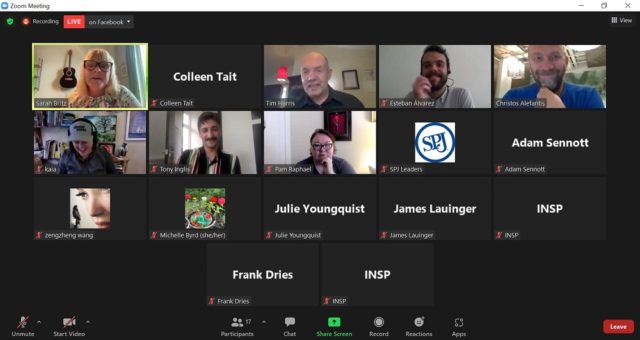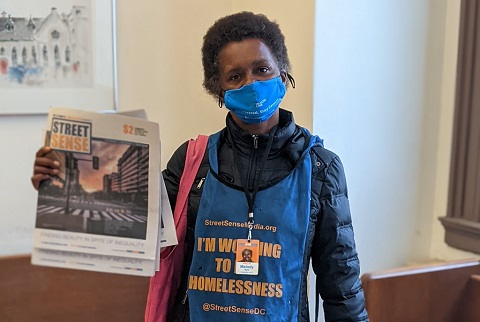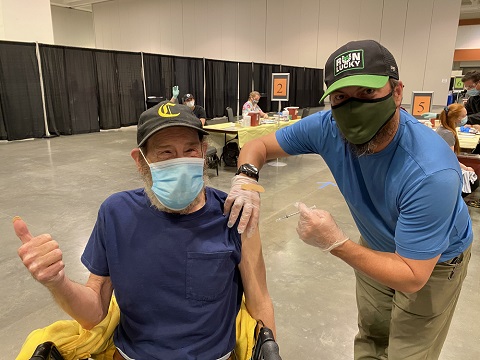By Christoph Gurk, BISS
This year Munich-based street paper BISS celebrated its 25-year anniversary. Coverage of some of their celebration projects have been available on INSP.ngo, including the creation of an art installation in central Munich and the filming of a documentary. Now available is the below interview with the street paper’s CEO Karin Lohr.
Karin, from looking at your CV, I can see that you worked in a number of very different jobs before you came to BISS. You trained in the hotel industry, you studied sociology and you worked for a market research company and also for a community bicycle enterprise. Is there something common to all these jobs that you’ve brought to your work at BISS?
Well, everything we’ve done is useful in some way, isn’t it? We’re all the sum of our experiences and we carry everything with us as we go. I went to a Business College, did book-keeping, lived abroad, learned languages and worked with numbers as well as people. At the end of the day, I’ve gained something from everything I’ve had to deal with and from the fact that I know that you can achieve anything as long as you put your mind to it.
You’ve been CEO at BISS since 2014. What led you to that job?
Basically, [it was] through my long-standing connections with BISS: with the project [itself] and the people who built it up, like Hildegard…
Hildegard Denninger, your predecessor in the role of CEO?
Exactly. We’ve known each other since I was a trainee in the hotel industry. In those days I was youth representative on the hotel workers’ council and she was chair of the hotels arm of the Catering & Hospitality Industry’s trade union. We got to know each other there, became good friends, and over the decades we’ve been involved in lots of projects together. When I was working for a market research company, Johannes Denninger – who is the honorary chair of Dynamo Cycle Services – told me about a job going there and encouraged me to apply for it. And though I’m no social entrepreneur and didn’t understand the first thing about bicycles, the idea of working there excited me. I wanted to have a go at helping to run a business in the third sector. And, you know, I really enjoyed that job, because I came into contact with a lot of people, customers and co-workers, but at the same time it was really clear that it wasn’t about making a profit but about helping people to have a better life. While I was at Dynamo Cycles there was a lot of overlap with the work BISS was doing, both from a content point of view and in practical terms. And when they were looking for a successor to Hildegard, they asked me. And I agreed to it, even though it wasn’t easy leaving Dynamo.
BISS is now celebrating its 25th anniversary. How come Munich, of all places – and one of the richest cities in the country – was the place where the street paper was launched?
That’s down to the Protestant Academy in Tutzing [and] to the man who was standing in as Principal at the time, Dr Jürgen Micksch, in particular. Back in the early 90s, he organised a conference on homelessness. Street papers already existed in America and England, and the idea was to do the same thing here. Social workers had been invited to the conference, but there were journalists and homeless people there as well, and people said, “Let’s just give it a try”. That’s how BISS came into being – and we still try to keep the spirit of the early days alive. If it feels right, don’t spend weeks and months deliberating about it, and wondering whether or not it will work, just do it. That way, we’re always learning new things and sometimes we surpass ourselves, because things can happen that you never see coming. Like with our anniversary celebrations at the Wittelsbacher Platz: It took us ages to get all the permissions, and if we’d known beforehand that it was going to take so long, we probably wouldn’t have done it. But in the end, not only did it all work really well, it ended up surpassing all our dreams and expectations.
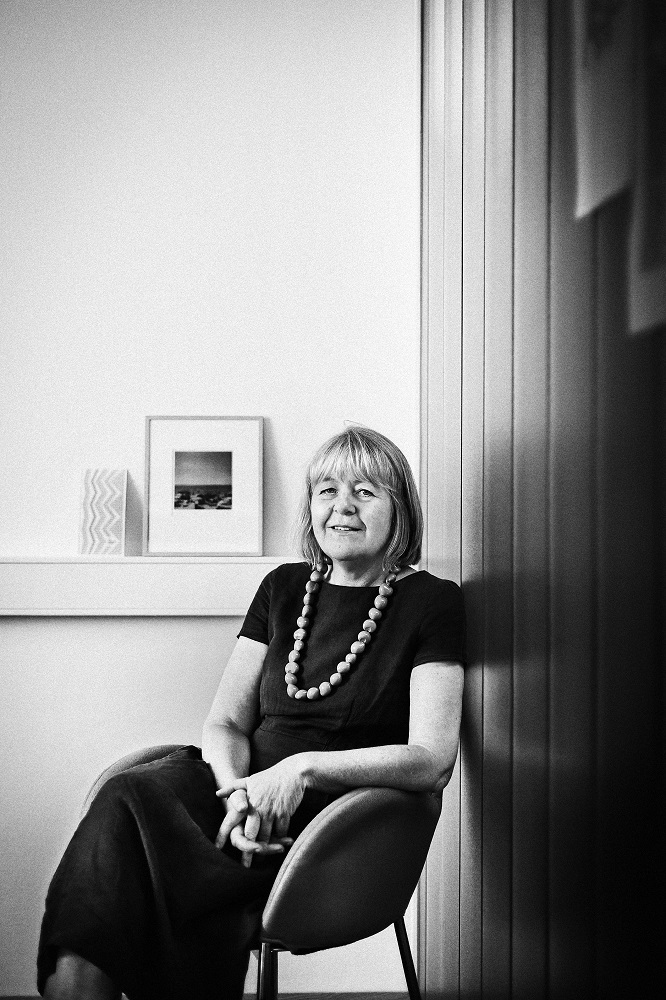
25 years of BISS: that’s a success story for all street papers. Nearly every city in Germany has its own street paper now. You might even ask whether there is anything special about BISS anymore.
I think there is. And it’s this: we place homeless people at the centre of every issue. Without exception. All the street papers in Germany are professional. They report on topics which otherwise wouldn’t get covered. They support the poor. Street papers are important, but as far as we are concerned, they are just a means to an end. Our mission is to help people who are having a bad time, who in many cases are homeless, who have no money and who have fallen through every safety net. We offer these people something they can succeed in: they can start selling the paper straight away. That way we pick them up and get them involved. Aside from the quality of our content, BISS is unique in the way we go one step further: we offer vendors permanent employment.
Why is that important?
Firstly, because a permanent job sorts a number of things out. The vendors contribute to pensions, social security and health insurance – and they pay taxes too, of course. They have a contract which states how much they earn and how many copies they are expected to sell, what rights an employee has and also what responsibilities [they have]. But above all, getting a proper job is a reason to be proud. Nearly everywhere the message is that you can’t give permanent jobs to people who have social and personal problems like these. At BISS we have said, “Yes. you can”. We started [out] with three vendors. One of them is still with us and, today, 51 out of 100 of our vendors have permanent contracts.
So, you just have to try things?
Exactly.
Let’s come back to this idea about putting the vendors at the centre of your work. What sort of people are they?
Generally speaking, they are mostly people over 40. We try to help younger people to get involved in one of the social enterprises in Munich, so they can catch up with their education and get some qualifications. There are more men than women as well, but you can’t generalise much beyond that. All of our vendors have unique stories which have led to them being at BISS. Some of them have worked all their lives, in jobs like catering, but now they’re retired they haven’t got enough money to live on. We’ve got vendors who used to have their own home, a job, a family, and then lost everything after a real crisis. Some of them have lived on the street for years. Some are refugees; some came to Germany looking for work. But one thing unites them all: poverty. You can only be a vendor for BISS if you are in need.
Do you check?
Of course. If someone applies to us, our social worker will ask them what they are living off at that time. We ask for documentation, such as a letter from the job centre, which confirms how much unemployment benefit, or social security or EU pension they might be getting. Whatever documentary evidence they have, they have to show it to us.
How little do they have to be earning to qualify as a vendor for BISS?
There isn’t a specific sum. Basically, if he or she is getting no more than basic social security, then they can work for us. We have vendors who could draw social security but would rather sell BISS. We support people like that because we strive to enable people to lead independent lives without help from the state. And apart from the money, what’s always important is being busy and having social contact.
“We place homeless people at the centre of every issue”
So it’s about doing something rather than sitting around…?
Yes. Poverty makes you lonely. If you’ve got no money, and nothing to do, what’s the answer? A BISS-vendor has status and is respected by his or her customers. There are regular customers who look out for that vendor, check whether they are in their usual spot, ask them questions and chat. And if you’ve been on the margins of society, doing this brings you back in: you’ve got a job and you’re earning. Many of our vendors tell us that they can’t be away from their spot for very long: their customers would miss them too much.
At the same time, the permanently-employed vendors have to sell a particular number of copies each month. I know from the writers’ workshop that many vendors feel under pressure to meet their targets each month.
Sure. That’s our expectation, but we trust them to meet it. My experience has been that it’s not an excessive demand, but a challenge they are able to overcome. Once they’re selling 400 copies a month, we give them a permanent contract. But that kind of thing doesn’t happen overnight. They’ve either got to have been selling that many before we take them on, or they were well on their way to doing so. And if one month someone sells less than that, but sells more another month, that’s absolutely fine. The working relationship is set up to function for people for whom it would have been impossible to work in an office, with other people, at a given time, for a given number of hours, every day. I would say this: none of our vendors could work in that way. As one of our vendors you can work more one day, less another, and on some days not at all. Daily attendance isn’t compulsory.
Vendors receive €1.10 per sold copy. Is that enough to live on, especially in a city like Munich?
Well, of course that depends on an individual’s total income. A vendor who sells 400 copies doesn’t just have €440 at the end of the month, but €630 net. If she or he has got a small pension as well, for example, they can probably live off what they earn selling the paper without having to claim state benefits. And that’s what a lot of our vendors do. And we help them in lots of other ways, too: with false teeth if they need them, kitting out their new home, helping with the cost of medicines or sometimes even with the cost of a holiday.
Is the €1.10 that BISS gets per copy enough to cover all that help?
On top of the money we get from sales of the paper, we get an income from selling advertising and, like other social enterprises, we also get some local grant aid. The income from our business activities covers our expenditure i.e., producing the paper, paying the staff and overheads like rent, electricity and so on. Donations all go to our vendors or other needy people. All of the individual help we offer is financed by donations, which also account for a portion of the wages we pay to vendors. Each permanently employed vendor has one or more sponsors. We don’t take donations and invest them in the paper, such as to increase its size from 32 to 60 pages, or to go from black and white to full colour. Instead, we invest in the vendors. We have a very transparent admin set-up and, luckily, we’ve been able to offer proper payment to the freelance journalists, photographers and graphic designers who work for us. That’s important, because at the end of the day we want our vendors to be selling a good product.
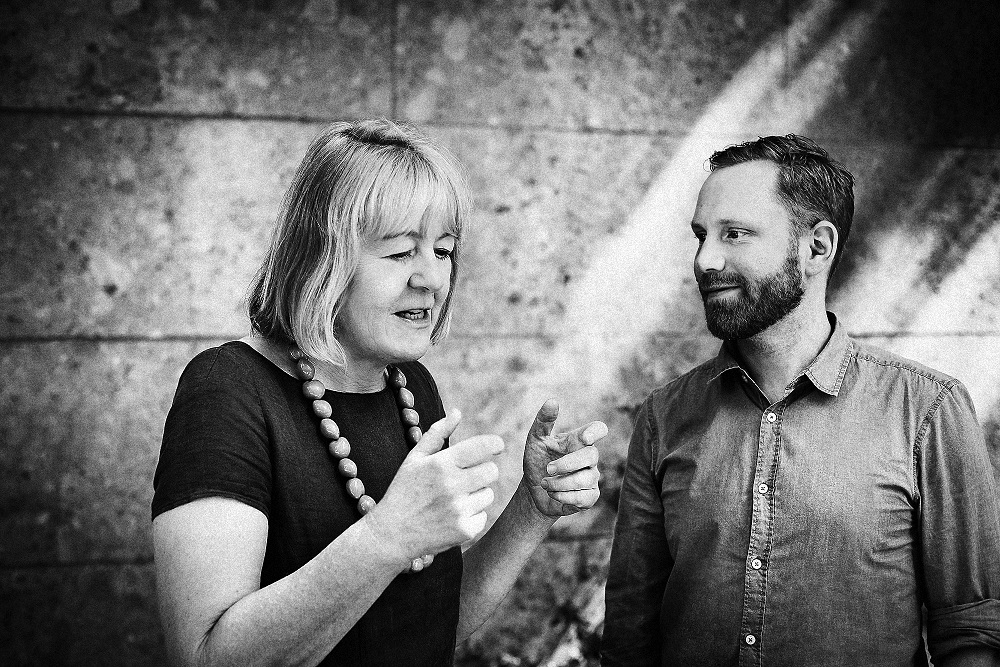
Do you think that most people buy BISS because of the articles or because they want to help?
I think it’s both. A lot of people want to support a particular vendor, or even BISS. Many people like to read the features, particularly from the writers’ workshop. We also publish articles on topics which otherwise don’t get discussed. We want to put points of view in BISS that you wouldn’t read anywhere else. We only have 32 pages and we want to use them well, so that we can help to change things.
In any case, BISS has been more than just a street paper for some time. There’s the BISS Foundation; the BISS Family Plot, where your vendors can be buried if they have no final resting place; and our vendors even lead BISS City Tours.
Again, the same things apply. Everything we do is to help our vendors. The tours help vendors to earn a bit more money and they get to know new people, and the people who go on these tours get shown a side of Munich they otherwise wouldn’t see.
Germany is doing better than it has for a long time, yet the gap between rich and poor is getting bigger all the time. Does BISS notice this?
Yes, definitely. You can see it in particular through our vendors’ children, as they often inherit their parents’ poverty. Social conditions in Germany are too rigidly cemented and there are too few opportunities for people who don’t have much money.
Does that discourage you? You help people for years on end, but, at the end of the day, apart from a few exceptions, their children are never able to escape poverty.
No, I’m not discouraged. I’m angry more than anything. In my opinion, it’s a question of politics. You have to start much earlier when it comes to supporting children from poor backgrounds. It’s a structural problem that needs to be addressed urgently. We can illustrate the problems and make poverty and social injustice visible again. That’s what our anniversary project is about, really. It was a deliberate decision to choose the Wittelsbacherplatz as a venue, right in the city centre; a place where you don’t see poverty any more. Most people go into the city centre either to work or to go shopping. The whole area is like an amusement park for the well-off and that’s the reason why it was important for us to be visible in that place.
“In another 25 years, we hope we’ll still be here, because poverty won’t have been eradicated by then!”
Another big issue in Munich is the housing market. What’s your sense of that?
Our vendors would have no chance in the regular housing market here. Fortunately, we reacted early and got shares in housing co-operatives, like the Isar Housing Co-operative and Wogeno Munich. Some of our vendors live in these houses quite unobtrusively. Apart from that, every now and again we hear of people offering property to rent, through our networks and through the work of the foundation, one of whose explicit foci is the creation of more places to live for socially disadvantaged people.
The BISS Foundation also wanted to use the former women’s prison at Neudeck for a hotel project that would offer apprenticeships to disadvantaged young people. But the Bavarian State Government decided instead to sell it to an investor who is now building luxury homes and advertising them all over the city. Does it hurt when you walk past the billboards?
Yes, sure. But we are less interested in yield than in social gains. That’s what makes me so cross about politics here in Bavaria. The [ruling, centre-right] CSU party can’t – or won’t – see what’s possible. It’s the same with refugees: they’ve got themselves onto college courses, they’ve learned German, done everything they can to integrate and they still get rejected. It’s not just inhumane, it also doesn’t make sense, because it flies in the face of the job market. We’ve employed a couple of refugees recently. One of them has a provisional permit; the other is facing deportation. We think the authorities could have made a different decision, but the courts are independent. But what’s happened now is that our vendor has had his work permit withdrawn. Overnight, he finds he isn’t allowed to sell papers any longer and, because of that, he is now dependent on state aid. He’s also been told to go back to living in a hostel, because he’s not working, is he? So here we have someone who has done everything possible to live in Germany independently, and he’s deliberately being made into a hardship case. That is short-sighted and incomprehensible. These are the sorts of topics we want to draw people’s attention to in our paper.
Your next landmark anniversary will be in 2023. Where will BISS be by then?
Firstly, we hope we’ll still be here, because poverty won’t have been eradicated by then! We want to go on helping people who live with little money and big difficulties. What we would wish for is to have more influence in those places where structural problems can be solved. We don’t want to be part of the political system, but we would happily give advice from the side-lines. When politicians like Herr Söder [CSU Minister President of Bavaria] say they that want to do more to help the homeless and then announce the setting up of mobile service teams as though they were some kind of model project, well that’s just unprofessional. He’s ignoring the fact that these projects already exist, and it deflects from the necessity to look properly at structures if you want to make long-term changes. We would gladly help with that.
Will you be staging another big art installation somewhere in the city at your next landmark anniversary celebrations?
Who knows? We know how to organise one now! We won’t be running out of good ideas for at least another 25 years, I can promise you that.
Translated from German by Peter Bone




